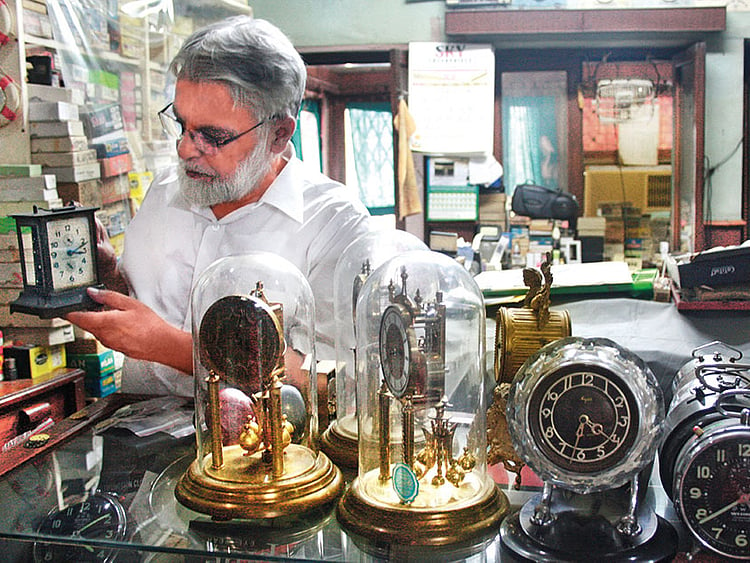NEW DELHI: At a time when watches are evolving into next-generation devices, some even performing the role of a heart monitor, and moving far away from their classical origins, there are watches and clocks of the bygone era that still find their muse who brings them back into ticking order.
Along the narrow, meandering bylanes of old Delhi, inside the Haveli Haider Quli and adjacent to Fatehpuri mosque in Chandni Chowk, a composite bursting with shops and hawkers and a myriad forms of mobility jostling for space including two-wheelers, rickshaws, pedestrians and cows, stands a once magnificent three-storey building that must have epitomised the beauty of Mughal architecture. But today, the 300-year-old haveli, or traditional mansion, is showing signs of its age unimpeded by any effort to attend to it deteriorating condition. A few moments spent taking in its fading splendour and shedding an unseen tear for its erstwhile glory seem an honourable thing to do.
Ticking glory
The sprawling three-storeyed mansion is today home to shops and apartments. And it’s easy to miss the signboard of Time Klinik (with a tagline that reads ‘Watch repairs West End, Rado, Favre Leuba, Titioni, Seiko, Citizen and other brand of watches’) in the clutter of signage unless you are looking for it. A narrow and dingy staircase awaits your tread as you haul yourself up to a door that opens into a hall.
Many foreign tourists come looking for me. Many of them inform me that they have taken their watches to several countries, including Switzerland, for repairs, but without any luck.”
Inside the hall, a cornucopia of timepieces meet the eye. Several old pendulum clocks and cuckoo clocks adorn the walls — the oldest dating to the 18th century. There are plenty of watches on display, many more than a century old, each frozen in its own layer of time.
A lone employee is busy examining a watch through his eyepiece. Leaning over his worktable, he works with a surgeon’s precision at the component he is holding. Minutes later, he puts the piece down on the table and removes the eyepiece. On his face plays a satisfied smile.
In the midst of time pieces, watches and other paraphernalia are two more men. One is a customer, who is being attended to by the owner of Time Klinik, Ikhlas Ahmed Shafi, 69. He listens intently to the customer who describes the problem his watch has developed. Shafi proceeds to diagnose the problem and then asks the man to return in a few hours time to pick up his watch.
Shafi working with a surgeon’s precision while repairing a timepiece. Nilima Pathak/Gulf News
“Trust is a big factor when it comes to repairing watches,” Shafi says, settling back at his work desk.
He should know what he is talking about because Time Klinik is not just another watch repair shop. It’s a reputable destination for the despairing looking to see who can, effectively and with infinite love and proper knowledge, get their precious timepieces working again.
His fame has spread through word of mouth. “Many foreign tourists come looking for me. Many of them inform me that they have taken their watches to several countries, including Switzerland, for repairs, but without any luck. Sometimes, it takes me days to repair a watch, but seldom have I disappointed anyone,” he says.
Since the parts of some very old watches are no longer available, Shafi uses his tools to create them. “There’s no way I can fail a client. Some [watches] may be heirloom pieces,” he says. Shafi admits that at one time, he treated it merely as a job but his clients’ faith in him pushed him into this calling. “The hopeful look on a client’s face motivates me,” Shafi says.
Preserving time
While drawers of the wooden desks are full of boxes containing varieties of bottles and tubes of cleaning solutions, dismantled watches — their innards strewn on a work table — await a new lease of life.
The shop has been operating from the rented premises since 1992, though Shafi’s family has been associated with it since 1954, when the employers, who later sold it to Shafi’s father, ran it. He reveals: “For more than a 100 years, my maternal grandfather, paternal grandfather and his brother and sons have all been associated with the watch business.
Because the identification of a person is through the profession he follows, we are recognised as ‘ghadiwalas’.”
In 1976, his family started its own assembling units in Rajasthan and Uttar Pradesh. Over the years, as the business saw changes, the Shafis set up separate establishments.
How did he cope when mobile phones flooded the market and many people moved away from wearing conventional watches? “Initially, it did unnerve me, and I wondered how long I could go on. Both my sons are not interested in this trade. But I have noticed that watches are back in fashion,” says Shafi.
Sign up for the Daily Briefing
Get the latest news and updates straight to your inbox
Network Links
GN StoreDownload our app
© Al Nisr Publishing LLC 2026. All rights reserved.
